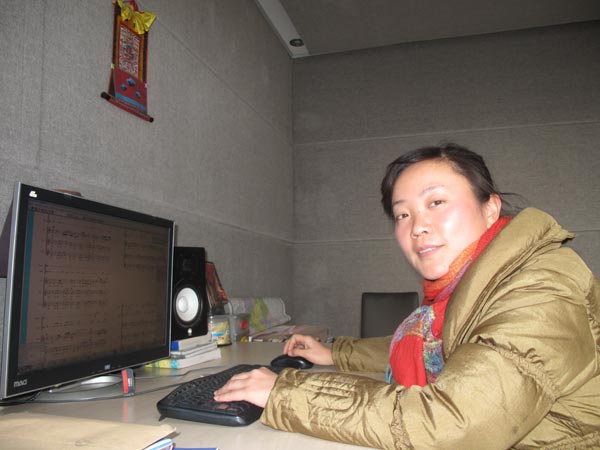 |
|
Yang Hua, a researcher on Muya music, at her studio in Chengdu. Huang Zhiling / China Daily
|
"Thirty years ago, people in some townships in the counties spoke the Muya language. But few do so now," says Quji Jiancai, a Living Buddha in the Guwa Monastery in Kangding county.
In 2008, Bamu, a singer with the Jiuzhaigou Art Troupe in the Aba Tibetan and Qiang autonomous prefecture in Sichuan, came to record a song in Yang's studio.
At first, Yang did not pay much attention to the 20-year-old as she was dressed like every modern Chinese girl. But when she sang the Ode to Mom, Yang found the song very special as the voice was deep and low, unlike the resounding Tibetan songs.
After the recording was over, Bamu told Yang it was a folk song of the Muya people. The song told how a girl working outside her hometown misses her mom, who says jewelry does not mean anything if one is not educated, and the singer wishes her mom good health.
"It was the first time I heard the word 'Muya'," Yang says.
During the next Spring Festival, Yang reached Bamu's home village of Juli in Kangding after nine hours of travel by bus and taxi.
"I stayed for 15 days in Bamu's home and enjoyed musical and theatrical performances in the Juli Monastery," Yang says.
In late 2010, she got a grant of 30,000 yuan ($4,810) from the Ministry of Education, to fund work for the protection, inheritance and development of the Muya music and culture. The Sichuan Conservatory of Music gave her an additional 30,000 yuan.
Bamu volunteered to be Yang's interpreter, but only in winter when her performance troupe was resting. That meant navigating icy, rugged roads at the Zheduo Mountain Pass, more than 4,000 meters above sea level.
We Recommend:
